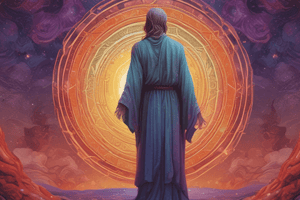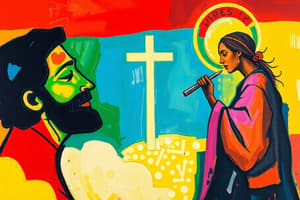Podcast
Questions and Answers
What does the term 'religious' primarily refer to in the context of religious experience?
What does the term 'religious' primarily refer to in the context of religious experience?
- Divinity or sacredness (correct)
- Scientific observation
- A personal opinion
- Something mundane
According to William James, what is a key characteristic that distinguishes religious experience from normal experience?
According to William James, what is a key characteristic that distinguishes religious experience from normal experience?
- It requires a witness.
- It includes rational thought.
- It is easier to explain.
- It is transcendental in nature. (correct)
What does 'transcendental' mean in the context of religious experience?
What does 'transcendental' mean in the context of religious experience?
- It is easily understandable.
- It involves scientific reasoning.
- It connects the individual to a divine realm. (correct)
- It makes one feel more isolated.
Why is understanding religious experiences considered challenging?
Why is understanding religious experiences considered challenging?
What challenge do individuals face when describing religious experiences in modern society?
What challenge do individuals face when describing religious experiences in modern society?
What is stated as more important than the cause of a religious experience?
What is stated as more important than the cause of a religious experience?
Which example is given to illustrate a transformative religious experience?
Which example is given to illustrate a transformative religious experience?
How can religious experience best be defined?
How can religious experience best be defined?
What is one common misconception regarding religious experiences today?
What is one common misconception regarding religious experiences today?
What is implied about the nature of religious experiences?
What is implied about the nature of religious experiences?
How did Jayjay Helterbrand's experience relate to his transformation?
How did Jayjay Helterbrand's experience relate to his transformation?
What aspect of personal experience does the term 'experience' generally imply?
What aspect of personal experience does the term 'experience' generally imply?
What might cause someone to doubt the authenticity of a religious experience?
What might cause someone to doubt the authenticity of a religious experience?
What does the statement 'it is not about the roots, but all about the fruits' suggest?
What does the statement 'it is not about the roots, but all about the fruits' suggest?
Which of the following best summarizes Rudolf Otto's view on religious experiences?
Which of the following best summarizes Rudolf Otto's view on religious experiences?
What dimension of religion focuses on answering questions about existence and humanity's place in the universe?
What dimension of religion focuses on answering questions about existence and humanity's place in the universe?
Which concept is central to the soteriological dimension of religion?
Which concept is central to the soteriological dimension of religion?
What role do symbols play in religious traditions according to the symbolic dimension?
What role do symbols play in religious traditions according to the symbolic dimension?
How does the anthropological dimension of religion contribute to human experience?
How does the anthropological dimension of religion contribute to human experience?
What is a defining feature of the moral dimension of religion?
What is a defining feature of the moral dimension of religion?
What does the organizational dimension of religion emphasize?
What does the organizational dimension of religion emphasize?
Which of the following is an example of a soteriological belief in Christianity?
Which of the following is an example of a soteriological belief in Christianity?
How do religious rituals typically function within a religion?
How do religious rituals typically function within a religion?
Which of the following statements is true regarding the moral dimension of different religions?
Which of the following statements is true regarding the moral dimension of different religions?
What is often the role of priests or pastors in many religions?
What is often the role of priests or pastors in many religions?
Study Notes
Understanding Religious Experience
- Definition of Terms: "Religious" relates to divinity and sacredness, while "experience" refers to personal or subjective events in life.
- Meaning: Combined, "religious experience" signifies a personal encounter with the Sacred viewed through a religious lens.
William James and Religious Experience
- Contributions: William James distinguished between normal experience and religious experience, emphasizing transcendental qualities.
- Characteristics: Religious experiences are characterized by a sense of transcendence that disconnects individuals from normal physical realities and intensifies focus on the divine.
Challenge of Modern Recognition
- Contemporary Skepticism: In modern society, claiming a religious experience may lead to skepticism or accusations of mental instability.
- Experiential Nature: Such experiences are often subtle and can occur without conscious awareness, making them difficult to categorize.
Rudolf Otto's Perspective
- Accessibility: Otto asserted that religious experiences are not universally apparent and require conscious effort to recognize.
- Subtlety of Experience: These experiences often happen in a mundane context, highlighting their transformative potential.
Consequences Over Causes
- Focus on Outcomes: Emphasis should be on the effects of religious experiences rather than their origins.
- Transformative Power: Religious experiences can lead to significant life changes and deeper devotion to faith.
Notable Examples
- St. Paul: His transformative experience on the road to Damascus profoundly shaped the development of Christianity.
- Siddhartha Gautama (Buddha): His experiencing Nirvana led to the founding of Buddhism.
- Jayjay Helterbrand: Overcame addiction through a miraculous event involving his daughter, showcasing a personal transformation.
- Manny Pacquiao: His story illustrates the impactful changes that can stem from religious experiences.
Fundamental Features of Religion
-
Cosmological Dimension
- Religion addresses existential questions about humanity's place in the universe.
- Provides explanations regarding creation, nature, meaning, and the cosmos.
- Utilizes myths, theories, and visions to impart understanding of the world.
-
Soteriological Dimension
- Offers frameworks for salvation and answers regarding the afterlife.
- Common beliefs include concepts like heaven and hell in Christianity, samsara and moksha in Hinduism, and nirvana in Buddhism.
-
Anthropological Dimension
- Encourages understanding of existence beyond the physical realm.
- Promotes values of community living while inspiring pursuit of greater ideals beyond human comprehension.
-
Symbolic Dimension
- Involves the use of symbols and rituals to convey sacred meanings.
- Symbols (e.g., the cross in Christianity, "om" in Hinduism) and rituals serve to enrich personal spirituality and establish traditions.
-
Moral Dimension
- Establishes a moral framework guiding right actions aligned with religious teachings.
- Different religions present diverse interpretations of morality, influencing concepts of good and evil.
-
Organizational Dimension
- Recognizes authority structures within religious contexts.
- Religious leaders (e.g., priests, pastors) often undergo extensive training, while some faiths emphasize personal interpretation and internal authority.
-
Theological Dimension
- Central to religion is the acknowledgment of a supreme being or beings.
- Understanding a religion involves knowledge of its divine aspects, with various forms of devotion expressing this belief in the divine.
Studying That Suits You
Use AI to generate personalized quizzes and flashcards to suit your learning preferences.
Description
Explore the complex nature of religious experiences in this quiz. Delve into what constitutes a religious experience and consider the various forms it may take beyond witnessing miracles or divine encounters. Test your understanding and reflect on your own perceptions of spirituality.




